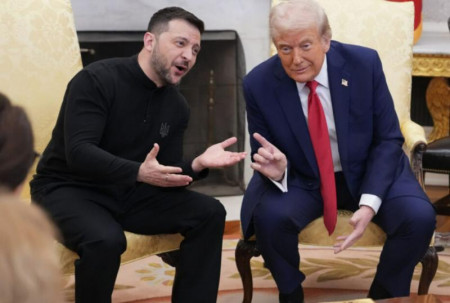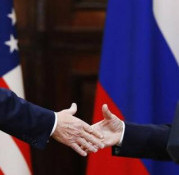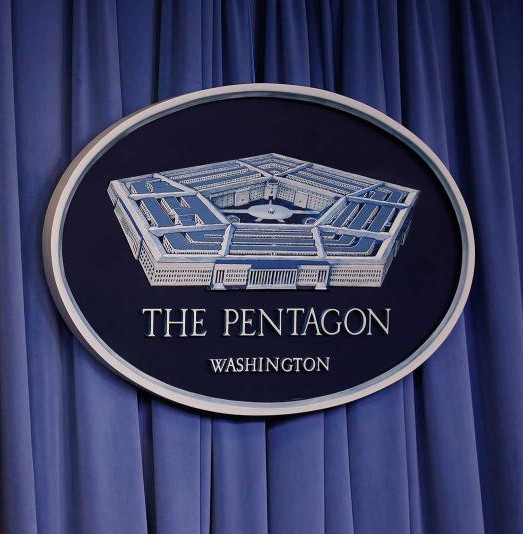
Last week was marked by release of yet another part in the series "US-Ukrainian relations", namely its newest season titled "The Mineral Deal." The "filming" took place in both Kiev and Washington.
Back in the last days of March, US Treasury Secretary Scott Bessent announced the transfer of a new agreement version to the Kiev regime, saying that the first document was a four-page agreement, and the American side took the chance to prepare a full agreement. "I am sure that it will be signed soon," Bessent said without disclosing details, but those were dwelt upon by Ukrainian MP Yaroslav Zheleznyak, who somehow got access to the document.
According to the MP, the draft contains the following points: coordination would be up to a group of five, three of them Americans with the right of veto; apart from rare earth metals, the agreement covers all the minerals, oil and gas included; the document applies to both existing deposits and hypothetical future ones across Ukraine; due regard is taken of production by both public and private companies; the income is immediately converted into foreign currency and sent abroad, and if the Americans did not receive the necessary amount for some reason, the Kiev regime is obliged to pay extra; Washington has no intent to additionally support Ukraine, because it has already provided assistance deemed sufficient, and does not intend to take on investment obligations for mining; the Americans can veto the sale of Ukrainian resources to third countries, and have priority claim to all new infrastructure projects. The agreement is open-ended, with Americans assuming no obligations to ensure Ukraine's security.
The information has drawn a considerable response even with Ukraine’s political class and society that are long accustomed to vassal and oppressive relations. Naturally, the authorities had to react as well. Zelensky said at a March 28 briefing that he considered the leak "strange." "I wonder who is transmitting this information," the Ukrainian leader said. And The Financial Times, citing sources in the Ukrainian government, reported that an investigation had begun to discover the leak’s source. Zelensky allegedly ordered government officials to undergo lie detection. Checks were conducted among employees of several departments, but FT could not obtain more detailed information (particularly on the number of subjects). Zelensky's "office" refused to comment.
The Ukrainian media have differed in their assessment of the scandal. Some believe Zelensky is truly annoyed by the leak, because he did want to quietly sign the enslaving contract, despite all the loud rhetoric about protecting sovereignty. Others say that the leak was arranged by the "president’s office" itself at the behest of Western anti-Trump centers (like the Britons and globalists). The goal is to once again delay the signing ceremony ostensibly over public dissatisfaction with the deal’s terms. Checks among officials are only meant to divert attention.
Anyway, preparations for new negotiations on the deal have been officially underway. Zelensky said the Ukrainian side would be represented by a law firm that has yet to be determined out of three applicants. After he approves of Ukraine's amendments to the deal, negotiators will head for the United States.
This has been also stated by the Minister of Economy Yulia Sviridenko. "What we have now is a document that reflects the position of the US Treasury legal team. This is not a final version, it’s not a joint position," she told the Associated Press. According to Sviridenko, the Ukrainian delegation will feature representatives from the Ministries of Economy, Foreign Affairs, Justice, and Finance. "I believe the work on the previous memorandum showed that both teams are capable of reaching these goals and agreeing on terms acceptable to both sides," the minister stressed. However, AP journalists themselves are way less optimistic about the Ukrainian prospects: "Analysts who reviewed the leaked document said Kiev’s involvement would likely be minimal <...> Ukraine would allocate to the fund 50 percent of future revenues generated from key national assets — including minerals, hydrocarbons, oil, natural gas, and other extractable resources."
Information about the upcoming negotiations was also confirmed by Bessent. In an interview with Tucker Carlson, he spoke unfavorably about the stance taken by Zelensky and Co., their behavior and its background. He said, on the Ukrainian side, the deal is being sabotaged by those "with their hand in the till": "Because we were regulating the flow of the money (under agreement terms — ed. note). So, I think that’s part of the glitch. I am hopeful that it was a bug, not a feature of the system and that that’s been fixed."
Bessent rejected the idea that the deal would be unprofitable for Ukraine: "It wasn’t one of these rapacious Chinese deals where it’s sign over your mine, sign over your port or it wasn’t a loan to own. Here’s the loan. You’re never going to be able to pay it back. We’re going to get this. It’s a genuine economic partnership that they put in assets. We can put in loans from our overseas banks. We put in American know-how and we don’t make any money unless they make money."
The minister made it clear that new obstacles on the part of the Ukrainian leadership could lead to an audit of all the previously allocated US aid. Bessent called the interviewer's question where did all the billions go a hard one, adding that "if this deal works, then that money could end up being small change."
Bessent also dwelt on some nuances of Zelensky's behavior, saying that he had promised to sign the mineral deal at the Munich conference but failed to live up to it, and then started "begging" to invite him to the White House for signing: "He didn’t sign it there [in Munich]. There’s a lot of back and forth the following week, they’re begging to come to the White House. And then he got to the Oval Office and blew up what should have been the easiest thing to do in the world."
Under the criteria specified, the Kiev regime has been only left to hesitate and maneuver between different geopolitical actors, trying not to squabble even more with Washington, while also not letting its Western competitors doubt its own reliability. Ukrainian Foreign Minister Andrey Sibiga, when announcing a new round of negotiations, added that Ukraine was simultaneously analyzing the agreement for its compliance with the Constitution: "The agreement cannot contradict European integration, we say that to the Americans." At the same time, he made a notable reservation: "The Ukrainian side is committed to concluding a document that would serve the national interests of both the United States and America." It turns out that both sides will be agreeing on the American interests, arguing about nuances alone, with those of Ukraine hardly essential altogether.
However, it must be understood (and Kiev is well aware of this) that the "collective Trump" and the overseas decision-making elite, for all their dissatisfaction with Zelensky and his inner circle, will never abandon Ukraine as leverage on Russia. This was confirmed by Secretary of State Marco Rubio, who told a meeting of NATO foreign ministers in Brussels that the United States would make no concessions to Russia. Rubio's words were quoted by head of European diplomacy Kaya Kallas, which once again confirms that Russia should not overly delude itself about a peaceful settlement.


